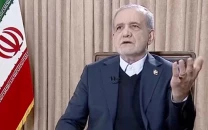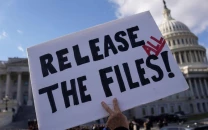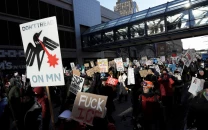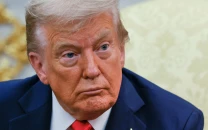Saudi foils 'terror' plot, busts two cells: Ministry
Ministry adds elements were at an advanced stage including preparing explosives and testing them outside Riyadh

Saudi foils 'terror' plot, busts two cells: Ministry
The interior ministry said in a statement the suspects were "in contact with the deviant organisation abroad," a term usually used to refer to the al Qaeda network.
The suspects were working on "recruiting elements to execute criminal attacks targeting security forces, citizens and foreign residents, as well as public installations," it said in a statement carried by the official SPA news agency.
The ministry said two Saudis and six Yemenis were arrested, and it also named two nationals as wanted for questioning.
"Investigations revealed that those elements were at an advanced stage including preparing explosives and testing them outside Riyadh," the ministry said, adding that one suspect accidentally lost a finger during the tests.
The first Saudi suspect turned out to be the head of the cell in Riyadh, and he gave "detailed information" that led to the arrest of the six Yemenis, who also confessed to taking part in the plot, it said.
Police found "chemicals used for explosives as well as mobile phones wired to detonate explosive devices remotely," at an annex of a mosque in the capital, the ministry said.
Investigations also led to a link with the other cell in the western city of Jeddah, the kingdom's second largest city.
The ministry said that a Saudi member of that cell "who worked on preparing explosive chemicals" was arrested.
If any of those plots had succeeded, it would have been the first since the suicide bombing against assistant defence minister Prince Mohammed bin Nayef in August 2009.
The prince suffered only superficial injuries after the bomber got close to him and detonated his explosives.
Saudi Arabia witnessed a wave of deadly attacks by al Qaeda between 2003 and 2006, which prompted the authorities to launch a crackdown on the local branch of the group founded by slain Saudi-born Osama bin Laden.
Following the crackdown, Saudi al Qaeda militants fled to neighbouring Yemen, joining ranks with their comrades there under the banner of al Qaeda in the Arabian Peninsula, taking advantage of Sanaa's state's loose grip on power.
In June, a Saudi court jailed 11 suspected al Qaeda members to between two and 15 years for plotting attacking on US forces in neighbouring Kuwait and on oil installation in the energy-rich kingdom.
In January 2011, cross-border police agency Interpol issued an alert to police worldwide for 47 Saudis with suspected links to al Qaeda, following a Saudi Red Notice.
Saudi Arabia is a key US ally in the war against al Qaeda.
In May, a Saudi double agent who infiltrated al Qaeda in Yemen helped foil a plot to blow up a US-bound airliner.
The Saudi national who held a British passport was sent by Saudi counter-terrorism agents into Yemen as a mole after it was learnt that AQAP was developing an updated model of the underwear bomb that failed to explode in a Christmas Day 2009 attempt.



1721969212-0/BeFunky-collage]-(35)1721969212-0-208x130.webp)















COMMENTS
Comments are moderated and generally will be posted if they are on-topic and not abusive.
For more information, please see our Comments FAQ